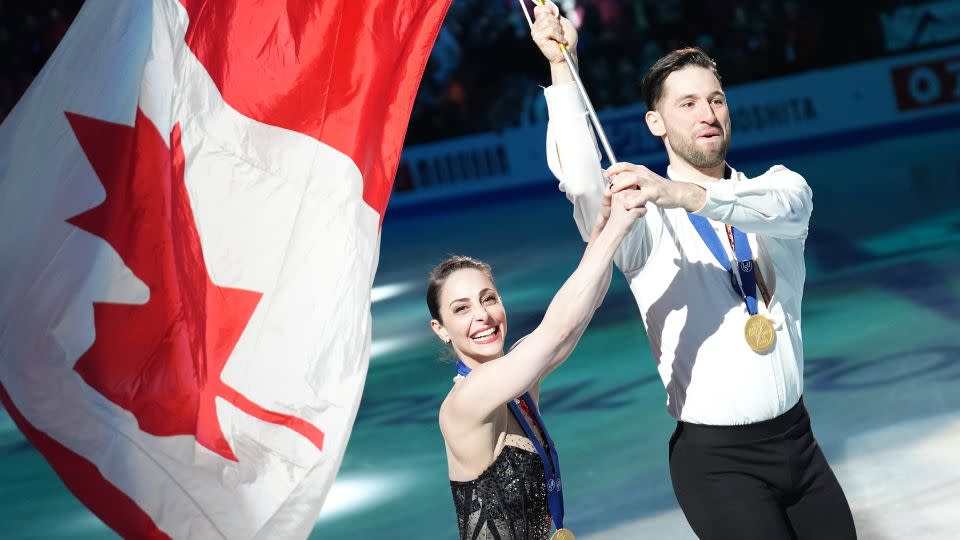A 40-year-old just became the oldest woman to win a World Figure Skating Championship. What she wants non-athletes to know
Battered by injuries and burnt out by the demands of her sport, Deanna Stellato-Dudek retired in 2001 – before many of today’s elite figure skaters were even born.
But this week, Stellato-Dudek achieved the unthinkable. With her partner Maxime Deschamps, the 40-year-old former retiree defeated athletes less than half her age and became the oldest woman to win a World Figure Skating Championship.
Even more remarkable, she did it in the pairs event – a notoriously dangerous discipline in which the top women are thrown across the ice, lifted over their partners’ heads with one arm, and tossed more than 10 feet in the air – all while spinning around multiple times.

Stellato-Dudek said she hopes the historic victory inspires everyone, even non-skaters, who might think it’s too late to pursue and achieve their goals.
“I hope it encourages people to not stop before they reach their potential,” she told reporters after winning the title Thursday night. “And I hope it transcends into other areas, not just in sports, but also in other areas of life, like work and professional careers.”
‘I’m the oldest everywhere’ – and proud of it
In a sport full of dangerous skills and merciless injuries, figure skaters often retire by their mid-20s.
That’s exactly what Stellato-Dudek did. She had an impressive junior career as a singles skater, winning the 1999-2000 international Junior Grand Prix Final and capturing the silver medal at the 2000 World Junior Championships.
But she suffered a spate of injuries, including a broken left ankle, a torn ligament in her right ankle and a significant hip injury. So she retired in 2001, at age 17.

For the next 16 years, Stellato-Dudek lived a relatively normal adulthood. She became a successful aesthetician and got married. She was no longer attempting risky triple jumps on international ice.
But the pangs of unfinished business kept nagging at her. What if she had quit the sport too early? What if she had more to accomplish in skating?
So she tried on her old skates and attempted the unfathomable – learning how to become a pairs skater in her 30s and returning to competitive ice.
While elite singles skating often rewards youth – requiring immense stamina to pull off quadruple jumps or triple-triple jump combinations – pairs skating comes with its own hazards. Female pairs skaters must have the strength to stabilize themselves high in the air and enough control to land powerful throw triple jumps on a narrow blade of steel. Failure to do either can end in disaster.

Then there’s the challenge of finding a partner. In 2016, Stellato-Dudek, who’s from the Chicago area, moved to Florida to start skating with Nathan Bartholomay, a 2014 Olympian who was looking for a new partner. They won two national bronze medals as a pair before Bartholomay’s injuries ended their partnership in 2019.
Undeterred, Stellato-Dudek “called every single coach I’d ever met in my entire life to see if they had anyone available” as a potential partner, she told writer Beverley Smith.
The search led her to Canada and Deschamps, a Quebec native who was more than eight years younger. He also had a successful junior career and has been open about his own personal challenges, including living with ADHD.
Stellato-Dudek uprooted her life in Chicago and moved to Montreal to skate with her new partner. The gamble paid off, and now Stellato-Dudek and Deschamps are unlikely world champions at ages 40 and 32.

Being the oldest female world champion was “not something that I ever set out to do when I came back to skating,” Stellato-Dudek said after her victory. “But I knew that if I were to accomplish my dreams it would inevitably occur because I’m the oldest everywhere.”
And being the oldest is perfectly fine with her.
“It’s something I carry with pride, and I’m very proud of it,” she said. “I hope a lot of athletes stay around a lot longer.”
One of the pair’s top rivals for the world title, German skater Minerva Fabienne Hase, bowed down to the couple after their winning performance. At 24, Hase was a baby when Stellato-Dudek retired.
“Deanna, with your age, it’s amazing. We were all bowing in front of you,” Hase said, according to CNN partner CBC. “You have my highest respect.”
2026 Olympics loom – with another obstacle
Stellato-Dudek is not done. Her next major goal is to compete in the 2026 Winter Olympics at age 42 – potentially shattering records once again.
But first, she needs to become a Canadian citizen. When she and Deschamps first teamed up a few years ago, they decided to represent Canada instead of the US because they thought it would be faster for her to get Canadian citizenship than for him to attain US citizenship.
“I’m doing all that I can do to make myself more attractive to Canada,” Stellato-Dudek said with a laugh after winning the short program this week, according to NBC Sports.

The citizenship requirement made the 2022 Olympics virtually impossible for the pair.
So “my goal has always been 2026, if my body can last that long,” Stellato-Dudek told Smith in 2020. “I’m already too old to be doing this, so I can be too old in six years, too. So what’s the difference?”
It won’t be easy. Stellato-Dudek already endures two to three hours of extra physical training every night to prepare her 40-year-old body for the next day’s practice, according to NBC Sports.
But her palpable intensity and voracious approach to training every day leaves little doubt she can be ready for the next Olympics.
“She is a warrior,” her partner said. “For her, it’s the Olympics every day.”
For more CNN news and newsletters create an account at CNN.com
